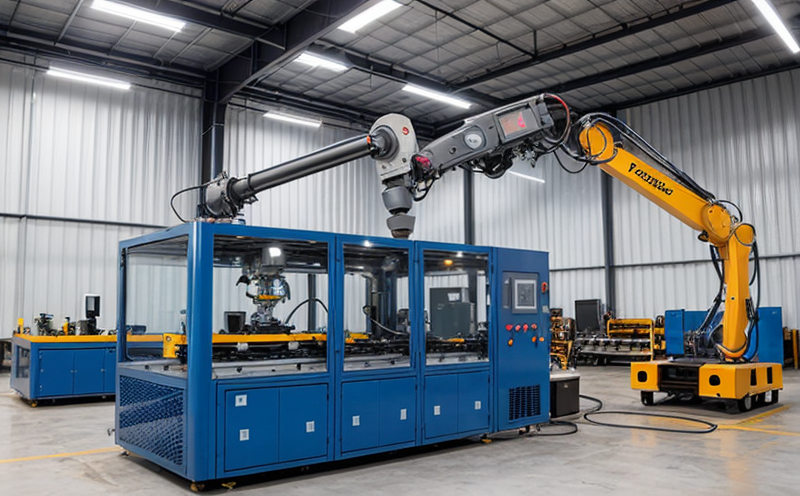ASTM F45 Performance Testing of Robotic Manipulators
The ASTM F45 standard is an essential benchmark for testing robotic manipulators in industrial manufacturing and processing environments. This service ensures that robotic systems meet stringent performance criteria, which are critical for maintaining quality control and safety standards across the sector.
Robotic manipulators are increasingly integral to modern industrial processes, performing a wide range of tasks including assembly, inspection, welding, and material handling. The effectiveness of these systems directly impacts manufacturing output and efficiency. ASTM F45 provides a standardized approach to evaluate robotic manipulator performance based on accuracy, repeatability, speed, and safety.
Compliance with this standard is crucial for industries that rely heavily on automation. It ensures that robotic systems operate reliably under various conditions and meet international quality standards. This service supports the needs of quality managers, compliance officers, R&D engineers, and procurement professionals who are responsible for ensuring that industrial robotics perform at their best.
The ASTM F45 test involves a series of predefined tasks designed to assess multiple performance metrics. These tests simulate real-world operational scenarios, providing accurate data on how well the robotic manipulator functions in different environments and under varying loads. The testing process includes:
- Accuracy checks
- Repeatability measurements
- Speed analysis
- Safety evaluations
- Ergonomics assessment
The results of these tests are critical for continuous improvement and validation of robotic systems. By adhering to ASTM F45, manufacturers can ensure that their products meet the highest quality standards, thereby enhancing customer satisfaction and operational efficiency.
Our team at [Lab Name] is equipped with state-of-the-art facilities and expertise to conduct ASTM F45 tests. Our laboratory adheres strictly to international standards, ensuring accurate and reliable results. We provide comprehensive reports that detail all aspects of the robotic manipulator's performance, allowing for informed decision-making by our clients.
ASTM F45 testing is particularly beneficial for industries such as automotive manufacturing, aerospace engineering, electronics production, and pharmaceuticals. These sectors require precision and reliability in their manufacturing processes, making ASTM F45 compliance a priority.
Scope and Methodology
| Test Parameters | Description |
|---|---|
| Accuracy | Measures the precision of the robotic manipulator's movements relative to its target position. |
| Repeatability | Evaluates how consistently the robotic manipulator can perform multiple iterations of a task. |
| Speed | Determines the time taken for the robotic manipulator to complete tasks under specified conditions. |
| Safety | Assesses the risk of potential hazards during operation, ensuring compliance with safety regulations. |
| Ergonomics | Reviews the design and setup of the robotic system for optimal efficiency and comfort. |
The ASTM F45 test protocol involves a series of predefined tasks that simulate real-world operations. These tests are conducted in controlled environments to ensure consistent results. The testing process typically includes:
- Setting up the robotic manipulator according to manufacturer specifications.
- Performing accuracy checks by measuring deviations from target positions.
- Evaluating repeatability through multiple iterations of a task.
- Measuring speed in various conditions and loads.
- Evaluating safety features and potential risks.
- Assessing ergonomics to ensure the system is user-friendly and efficient.
The results from these tests are then analyzed to produce detailed reports. These reports include all findings, recommendations for improvement, and compliance with ASTM F45 standards. This data is invaluable for R&D engineers in refining robotic systems and ensuring they meet industry requirements.
Industry Applications
The ASTM F45 performance testing of robotic manipulators finds significant application across various sectors where precision, reliability, and safety are paramount. Key industries include:
- Automotive manufacturing: Ensuring consistent quality in assembly lines.
- Aerospace engineering: Maintaining high standards for complex components in space missions.
- Electronics production: Providing accurate placement of small parts with minimal error rates.
- Pharmaceuticals: Guaranteeing the precision required in handling sensitive materials and products.
In each of these industries, compliance with ASTM F45 is crucial for meeting regulatory requirements and ensuring product quality. The testing process not only verifies that robotic systems meet these standards but also helps manufacturers identify areas for improvement, leading to more efficient processes and safer operations.
Use Cases and Application Examples
ASTM F45 performance testing is applicable in numerous real-world scenarios. Here are some examples:
- Automotive Assembly Lines: Ensuring that robotic arms can handle heavy components with precision.
- Aerospace Component Inspection: Verifying the accuracy of robotic inspection systems for critical aerospace parts.
- Electronics Manufacturing: Confirming the reliability of robotic placement systems in microelectronics production.
- Pharmaceutical Packaging: Guaranteeing that robotic arms can handle fragile products safely and accurately.
In these applications, ASTM F45 testing helps manufacturers identify potential issues early on, leading to fewer errors and higher quality outputs. This service is particularly valuable for companies looking to enhance their manufacturing processes and ensure they meet the highest international standards.





